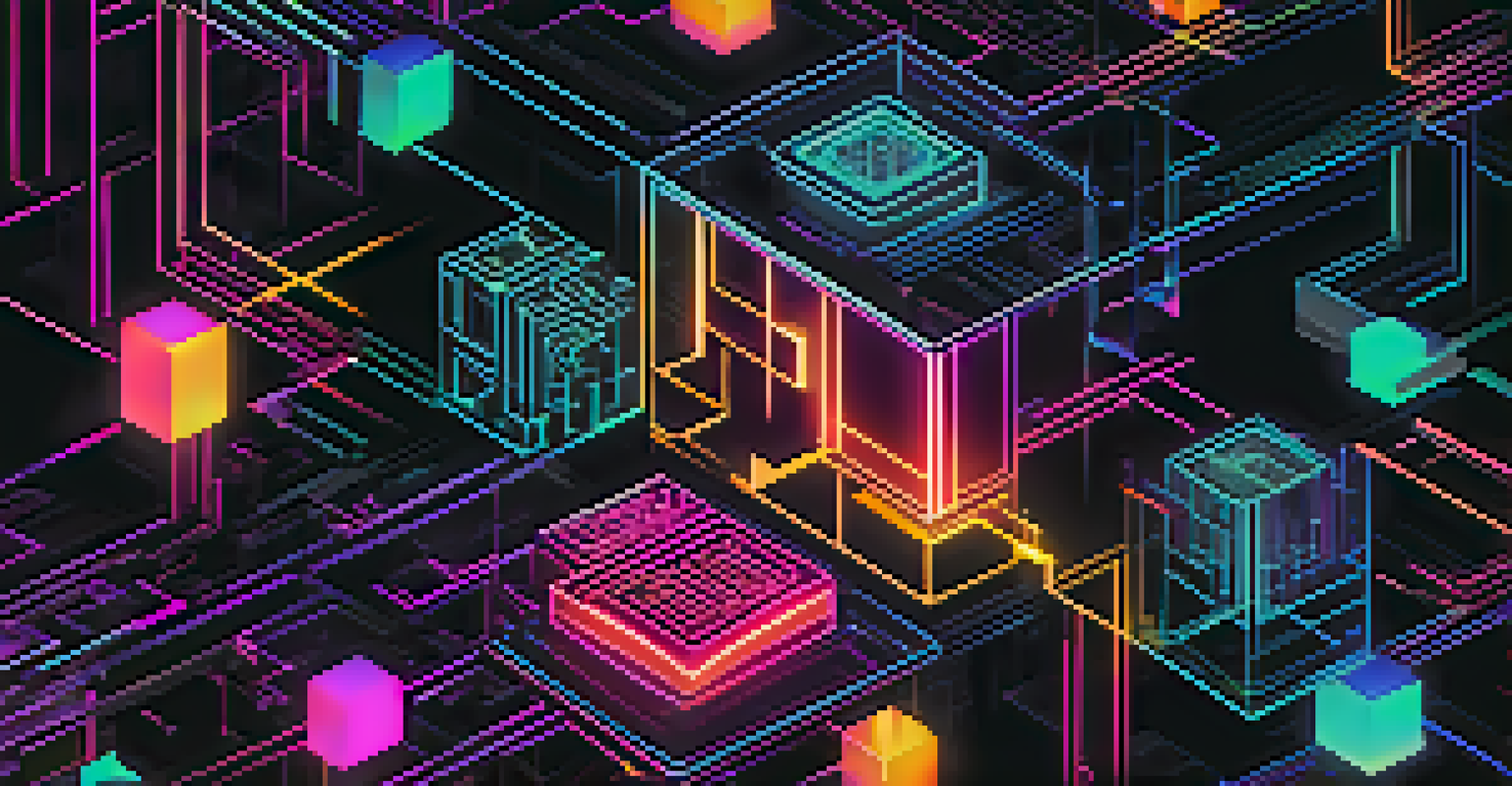Smart Contracts and NFTs: Automating Digital Rights Management

Understanding Smart Contracts and Their Functionality
Smart contracts are self-executing contracts where the terms are directly written into code. They run on blockchain technology, ensuring transparency and security. Think of them as a digital vending machine: once you put in the right input, the desired output is delivered automatically.
Smart contracts are the future of digital agreements, providing a reliable and tamper-proof way to enforce terms without intermediaries.
The automation of these contracts eliminates the need for intermediaries, which can save time and reduce costs. By removing human error from the equation, smart contracts provide a more reliable means of enforcing agreements. This reliability is essential in industries where trust and accuracy are paramount.
In the realm of digital rights management, smart contracts can automatically enforce licensing agreements, ensuring that creators are compensated fairly each time their work is used. This capability marks a significant shift in how we view ownership and rights in the digital space.
What Are NFTs and How Do They Work?
Non-fungible tokens (NFTs) are unique digital assets that represent ownership of a specific item or piece of content, often linked to art, music, or video. Unlike cryptocurrencies like Bitcoin, which are interchangeable, each NFT has distinct characteristics that make it one-of-a-kind. Imagine owning a signed first edition of a book; that uniqueness gives it value.

NFTs are built on blockchain technology, which provides a secure and transparent way to verify ownership. This means that when someone purchases an NFT, they receive a digital certificate of authenticity that cannot be duplicated. This level of security is particularly appealing to artists and creators looking to protect their work.
Smart Contracts Automate Agreements
Smart contracts execute predefined terms automatically, eliminating the need for intermediaries and reducing costs.
The combination of NFTs with smart contracts allows for automated management of digital rights. For example, when an NFT is sold, the smart contract can automatically distribute royalties to the original creator, ensuring that they benefit from future sales or uses of their work.
The Role of Smart Contracts in Digital Rights Management
Digital rights management (DRM) has long been a challenge in the online world, where unauthorized sharing and piracy are rampant. Smart contracts can provide a solution by automating the enforcement of copyright agreements. This means that creators can set clear terms for how their work is used, and the contract will execute those terms without requiring manual oversight.
NFTs are not just a trend; they represent a profound shift in how we perceive ownership and value in the digital realm.
For instance, a musician could use a smart contract to specify that every time their song is streamed, a portion of the revenue is automatically distributed to them. This ensures that artists receive fair compensation for their work without relying on traditional platforms that may take a significant cut.
With smart contracts, the potential for abuse or oversight is minimized, allowing creators to focus on their craft rather than on the complexities of managing their rights. This shift empowers artists and content creators, giving them more control over their intellectual property.
NFTs as a Tool for Digital Ownership and Rights
NFTs serve as a powerful tool for establishing digital ownership, providing a way for creators to prove authenticity and ownership of their work. This is especially important in a digital landscape where copying and sharing are easy and common. By issuing an NFT for their artwork or music, creators can clearly indicate who owns the original piece.
Beyond just ownership, NFTs can also carry embedded smart contracts that dictate how the work can be used. For example, an artist might include terms that limit the resale of their NFT or specify that they receive a percentage of future sales. This ensures that creators maintain a connection to their work even after it has been sold.
NFTs Establish Digital Ownership
Non-fungible tokens provide a secure way for creators to prove ownership and authenticity of their digital work.
As more people embrace NFTs, the potential for redefining ownership in the digital age becomes increasingly apparent. This technology fosters a new environment where artists can thrive, knowing their rights are protected through secure, automated processes.
Challenges in Implementing Smart Contracts and NFTs
Despite their advantages, implementing smart contracts and NFTs comes with challenges. One major hurdle is the need for a solid understanding of blockchain technology, which can be daunting for many creators. Without the right knowledge or guidance, the process of creating and managing these digital assets can feel overwhelming.
Additionally, issues such as high transaction fees on certain blockchain networks can deter artists from utilizing NFTs. The cost of minting an NFT can sometimes exceed the potential earnings from the sale, leading to frustration and reluctance among creators. It's essential for the industry to explore solutions that make this process more accessible and affordable.
Lastly, there is the challenge of ensuring legal recognition of smart contracts and NFTs. As the technology evolves, laws and regulations need to catch up to effectively address the complexities of digital rights management. This ongoing dialogue will be crucial in shaping the future landscape of digital ownership.
Future Trends in Digital Rights Management with NFTs
As technology advances, the integration of NFTs and smart contracts into digital rights management is likely to evolve significantly. We may see increased adoption across various industries, from music to film to literature, as creators recognize the benefits of these tools. This trend could lead to a more equitable distribution of revenue among artists and content creators.
Moreover, as consumers become more educated about NFTs, there may be greater demand for transparent and ethical practices in purchasing digital content. This shift could push platforms to innovate and offer better services, ensuring that both creators and consumers benefit from these new technologies.
Challenges in Adoption Persist
High transaction fees and a lack of understanding of blockchain technology present significant barriers to implementing smart contracts and NFTs.
In the long run, the marriage of smart contracts and NFTs could redefine how we think about ownership and copyright in the digital age. It paves the way for a more secure and fair system where creators are rightfully compensated for their contributions.
Conclusion: Embracing the Future of Digital Rights
The combination of smart contracts and NFTs represents a significant leap forward in how we manage digital rights. By automating processes and ensuring fair compensation, these technologies empower creators and redefine ownership in the digital landscape. As we continue to explore these innovations, the potential for a more equitable creative economy is within reach.
It's essential for artists, musicians, and creators to stay informed about these developments, as they hold the key to protecting their work and rights. By embracing smart contracts and NFTs, creators can navigate the complexities of digital ownership with confidence.

Ultimately, the future of digital rights management will rely on a collaborative effort between creators, technologists, and lawmakers. By working together, we can build a system that respects and honors creativity in all its forms.